Andy Awards Recognize CMU Staff for Outstanding Work
By Jen Roupe
& Yana Ilieva
Six staff members and two teams were recognized for their meaningful contributions at Carnegie Mellon University’s 29th Annual Andy Awards ceremony, held Wednesday, Oct. 18, in McConomy Auditorium. In addition, Staff Council presented Staff Service Awards to individuals celebrating 30, 35, 40 and 45 years of service to the university.
The Andy Awards, named for Andrew Carnegie and Andrew Mellon, recognize the legacy that CMU staff members forge through their hard work. Individual staff members and teams of colleagues whose work has had a significant impact on the university are recognized in six categories: Commitment to Excellence, Commitment to Diversity, Equity and Inclusion, Commitment to Students, Innovative and Creative Contributions, Spirit, and Teamwork and Collaboration.
This year’s nominees included 47 individuals and eight teams representing a diverse array of departments, functions and responsibilities across the university. The 2023 Andy Award Winners are:
- Phoebe Cook, Commitment to Excellence — Rookie*
- Robert Rosenstein, Commitment to Excellence — Veteran**
- Leia Delabahan, Commitment to Diversity, Equity & Inclusion
- Correy Dandoy, Commitment to Students
- Justin Dawber, Innovative & Creative Contributions
- Timothy Angert, Spirit
- Mechanical Engineering DEI Committee, Teamwork and Collaboration — Standing Team
- Winter Storm Elliott Response Crew, Teamwork and Collaboration — Special Projects
*recognizes staff who have been at CMU for less than three years
**recognizes staff who have been at CMU for greater than three years
Commitment to Excellence — Rookie
Phoebe Cook
Teaching Consultant
Eberly Center for Teaching Excellence & Educational Innovation
Phoebe Cook’s time at Carnegie Mellon has been short but jam-packed with learning opportunities, growth, leadership and praise.
In just over a year at CMU, Cook has left an indelible mark on her colleagues and the university. A teaching consultant with the Eberly Center for Teaching Excellence and Educational Innovation, her commitment to improving both its pedagogy and resources has benefited both faculty and graduate students alike.
“Phoebe doesn’t just affirm her commitment to CMU’s prioritization of inclusion and belonging, she creates and innovates in order to make those values manifest,” said Janet Lawler, a postdoctoral teaching consultant at the Eberly Center.
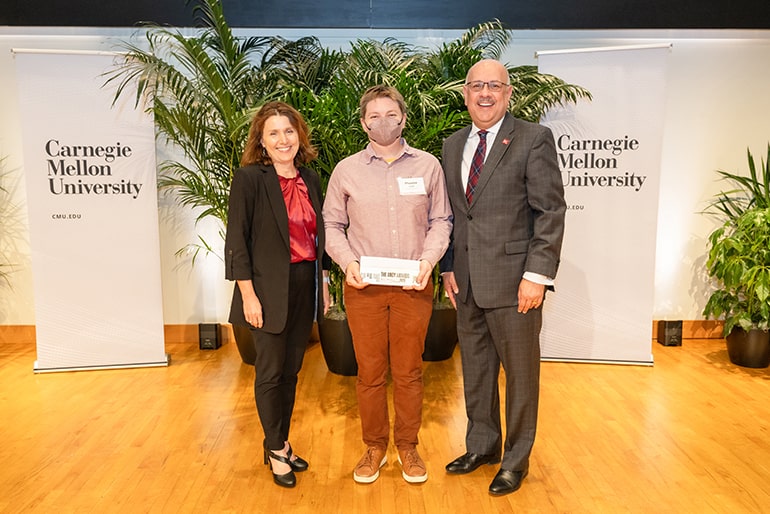
Phoebe Cook with Associate Vice President and Chief Human Resources Officer Michelle Piekutowski and President Jahanian.
Cook embodies these values on a daily basis, taking initiative to research, design and facilitate an entirely new seminar for graduate students on how to “REACH” their students, developing an evidence-based framework to help students feel connected, understood, successful and validated.
“Her REACH framework (Reframe, Explain, Affirm, Connect, Hold) was not only entirely new to the Eberly Center’s inclusive teaching curriculum, but also innovative across the profession,” said Lawler. “After only working in the center for six months, Phoebe single-handedly set a new training standard for inclusive teaching.”
While Cook’s day-to-day work is supporting educators, her goal is to create an inclusive teaching environment, empowering educators, students and her fellow teaching consultants alike.
Graduate teaching fellow Alex Tabor described the mark that Cook’s professionalism and willingness to support has left on him, saying “Phoebe is the special type of person whose contributions and presence across diverse settings pursues more equitable access, opportunity and experience for all through their own behavior and modeling. She’s left a lasting impact on my conception and practice of teaching and learning.”
Cook also takes active roles in contributing to Eberly Center research, facilitating university-wide events and helping make and conduct professional development training.
A natural leader, Cook stepped up to prepare, conduct and lead a two-week consultation trip to support colleagues in Carnegie Mellon in Qatar (CMU-Q) after external circumstances left her fellow teaching consultants understaffed. Marsha Lovett, vice provost for teaching and learning innovation, said “Preparing for this trip was not a small undertaking, and yet Phoebe was enthusiastic in doing what was needed before, during and after the trip.” Lovett especially praised Cook’s willingness to step up as being a key factor in the Eberly Center’s ability to resume the in-person partnership with colleagues at CMU-Q — a partnership that resulted in positive responses to Cook’s thorough and enthusiastic work.
As Lawler put it, “Leadership is not something expected of a new employee, but the most remarkable work Phoebe has done for our center is in this capacity. In a collaborative work environment, a leader is sometimes organically produced, and that is Phoebe. All of the faculty and students she has worked with can attest to her kindness, empathy, dedication, and labor to make their work and their community richer and more fulfilling. I am confident her first year with the Eberly Center is just the beginning of a remarkable record of service to CMU.”
Commitment to Excellence — Veteran
Robert Rosenstein
Senior Portfolio Development Manager
Software Engineering Institute
Bob Rosenstein has served the Carnegie Mellon community for nearly 28 years, working his way up from an entry-level campus administrator to a senior-level management professional, and inspiring others along the way with his enthusiasm, selflessness and dedication.
As SEI’s senior portfolio development manager, Rosenstein currently manages more than $100 million in annual research and development (R&D) activities that are vital to national security. He brings military, government, academic and industry stakeholders together to ensure the currency, validity and accuracy of data used to guide the institute’s R&D activities, yielding strong mission partnerships and continual process improvements. He travels extensively, leading SEI’s participation in numerous technology conferences and outreach events each year and serving as a consummate ambassador for CMU to the tens of thousands of people he meets.
“Bob brings passion to everything he does in serving others; his heart is in the work,” said Gregory Touhill, director of SEI’s CERT Division. “He takes great pride in the value of his work and inspires others around him to embrace that passion in their work too.”
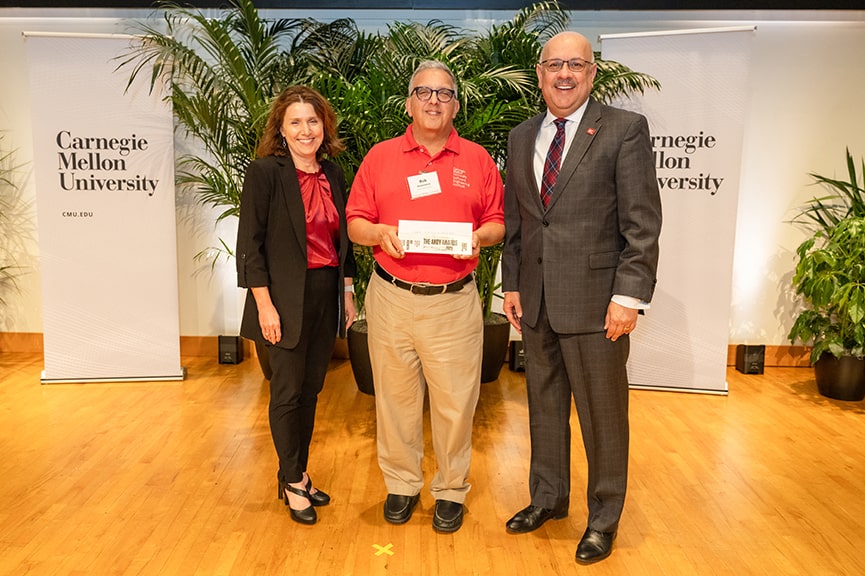
Robert Rosenstein with Michelle Piekutowski and President Jahanian.
“If someone needs help or if there is a difficult task to be done, Bob is the first person people come to for advice and counsel because he ‘knows how to get things done,’” said SEI Director and CEO Paul Nielsen. “He is an outstanding coach and translates his vast experience and keen mind to thoughtfully guide teammates to create innovative solutions and bring them to resounding successes.”
Beyond his official duties, Rosenstein actively seeks out opportunities to serve others. As the SEI’s United Way team captain the last two years, he has led a 27.5% increase in the average contribution. He is also the face of the AJ Awards, SEI’s employee recognition program, leading a team of volunteers to plan the event and serving as its beloved master of ceremonies. His energy and enthusiasm for the celebration of his colleagues is infectious, making the event one of the highlights of the year.
“Bob is an inclusive and collaborative leader, always looking to shine the spotlight to celebrate accomplishments of others and active in fostering a more meaningful sense of community by encouraging shared ownership in collective efforts,” said Nielsen.
Rosenstein is also known for his incredible attention to detail, which endears him to his colleagues.
“There is never a detail that is forgotten when Bob is at the helm. Bob’s mission is to make anything or anyone he touches ‘extra special’ and he selflessly never expects anything in return,” said Touhill.
Commitment to Diversity, Equity & Inclusion
Leia Delabahan
Senior Academic & Student Services Advisor
Integrated Innovation Institute, College of Engineering (Silicon Valley Campus)
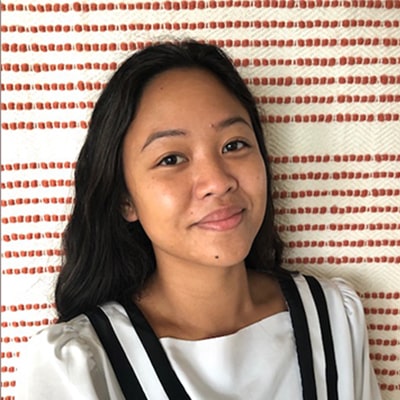 Far before campus initiatives and conversations brought diversity, equity and inclusion to the forefront, DEI was already a mindset and a mantra for Leia Delabahan. As the Integrated Innovation Institute (iii) representative on the College of Engineering DEI Committee, her unwavering dedication to DEI work has had an exponential impact.
Far before campus initiatives and conversations brought diversity, equity and inclusion to the forefront, DEI was already a mindset and a mantra for Leia Delabahan. As the Integrated Innovation Institute (iii) representative on the College of Engineering DEI Committee, her unwavering dedication to DEI work has had an exponential impact.
Delabahan played a crucial role in establishing the iii Equity in Action Committee, a group of staff and faculty committed to elevating DEI initiatives across three objectives: transparency, accessibility and community. She was instrumental in developing iii’s revamped DEI website, which outlines the committee’s commitments and progress, and provides resources for students. She also collaborated with the iii academic advisor in Pittsburgh, Gabi Rogers, to develop a peer mentoring program between incoming and continuing students.
“Leia’s dedication to fostering open and constructive dialogue among diverse groups of individuals has been instrumental in creating a more inclusive and understanding environment within our community,” said iii Director Peter Boatwright. “Her efforts are embedding DEI into iii’s culture. Because, to Leia, DEI isn’t a ‘checkbox’ — it is something she lives and breathes.”
In 2021-2022, Delabahan launched the DEI Fellows program to strengthen student representation and engagement in DEI work at iii. She continues to refine the program each year based on input from fellows, staff and stakeholders. The first DEI Fellows held bi-weekly coffee chats to foster open dialogues on key issues and compiled an extensive scholarship resource list. Delabahan implemented significant improvements last year, integrating the fellows into the equity in action subcommittees and extending the fellowship through summer for smoother onboarding. In this third year, she has improved the application process to remove implicit biases and launched an initiative to curate a student experience guide to help incoming students develop a sense of belonging at iii. Students in the program look up to Delabahan as a leader, mentor and advocate for fostering an inclusive and supportive community.
“Leia creates an environment where my voice is valued, fostering a sense of belonging and trust among the team,” said master’s student and DEI fellow Seemran Misra. “Leia's guidance and mentorship have been invaluable in helping me navigate complex issues and find the right solution.”
“Her exceptional communication skills and willingness to patiently explain concepts have empowered us to engage in meaningful conversations about diversity, equity, and inclusion,” said master’s student and DEI Fellow Maria Beatriz Manrique Ardila.
Delabahan also leads the DEI committee’s Intergroup Dialogue (IGD) effort. After being trained in IGD herself, she hosted a weeklong virtual training for faculty and staff and launched monthly IGD sessions to help her colleagues develop skills they could implement in their departments.
“Leia is enthusiastic about her DEI work and that passion motivated her colleagues to engage while strengthening the connection and belonging in their department,” said Alaine Allen, College of Engineering associate dean for diversity, equity and inclusion. “Leia is a tremendous asset and resource to Carnegie Mellon University.”
Commitment to Students
Correy Dandoy
Senior Academic Advisor and Communications Manager
Information Systems Program, Dietrich College of Humanities and Social Sciences
Correy Dandoy has an unwavering dedication to her students, ensuring they feel supported and capable of thriving at CMU.
A senior academic advisor for students in the Information Systems (IS) program, Dandoy goes above and beyond for her students. In addition to core advising duties such as helping them choose classes and navigate majors and minors, she has helped to develop multiple Information Systems student groups and a new advising model to better support student needs.
Dandoy’s leadership in developing the IS Ambassadors, connecting current students with prospective students and families, has created an enthusiastic community for students before they even commit to CMU. She’s also a key advisor and leader for the Women in IS student group, as well as a peer mentoring program that connects first-year students with support and resources to increase their success and engagement as students and young professionals.
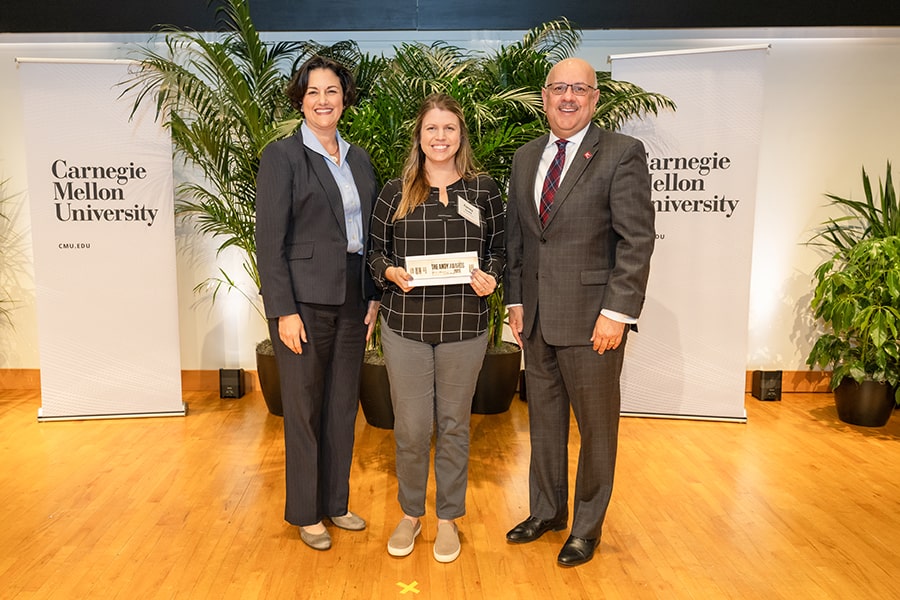
Correy Dandoy with Dean of Students Gina Casalegno and President Jahanian.
Dandoy also serves as the chair of the IS diversity, equity and inclusion (DEI) committee, further developing initiatives to ensure IS is a safe space for students of all backgrounds. She highlights diverse opportunities and experiences through the IS Instagram account that she created and continues to lead. The channel serves multiple purposes, highlighting resources and opportunities, celebrating student accomplishments and connecting the community.
Students in the IS program feel Dandoy’s work has helped them feel empowered to succeed. Gary DiLisio, director of undergraduate education, recalls being told by a group of her students how much she means to them. “One noted that her success both inside and outside of the classroom would not have been possible without Correy. She started to tear up as she told me about how she feels more comfortable approaching Correy than some of her closest friends and family members,” he said
A trusted confidant, Dandoy regularly checks in with her students about their challenges and lives, providing a non-judgmental environment that allows for open and honest conversations. As current student Amita Goyal put it, “Correy understands that college can pose a daunting challenge for many students, and she goes to great lengths to create a supportive and nurturing atmosphere where students feel comfortable expressing their concerns and seeking guidance.”
Dandoy dedicates her full attention to her students and remembers small details. In one instance she found out a student’s allergies prevented them from partaking in snacks during a professional development event, and took it upon herself to ensure that every future event had safe dietary options for every student.
Advisee Natasha Akali sums up Dandoy’s commitment to students as exceptional. “She has always made it clear that she cares about my success and is willing to help in any way possible. Her unwavering support, kindness and approachability have made her a trusted source of advice and guidance for me. I can confidently say that my CMU experience would not have been as positive without her support.”
Innovative & Creative Contributions
Justin Dawber
Director of Computing Services
Chemical Engineering Department, College of Engineering
Justin Dawber has spent more than 22 years improving the technological support for the Department of Chemical Engineering. Constantly assessing operations to implement new approaches, methods and processes, he improves organizational effectiveness on a technical level as well as a community one.
Leading the department’s technological transitions over two decades has taken Dawber from managing computer labs, to maintaining a fleet of laptops with specialized software, to supporting numerous varied personal computing systems, to implementing standard and specialized cloud computing solutions.
Dawber’s continued dedication has kept the department up to date with ever-changing computing standards and innovations to support students, faculty, staff and research.
Faculty member John Kitchin remembers Dawber’s indispensable enthusiasm and expertise when asked to set up a JupyterHub server for the department. Cloud computing requires a unique set of skills to set up and maintain servers, and Dawber’s implementation allowed the department to provide a uniform computational environment for students, customized for the classes they’re taking. Kitchin described Dawber’s support as “game-changing services in computing for education.”
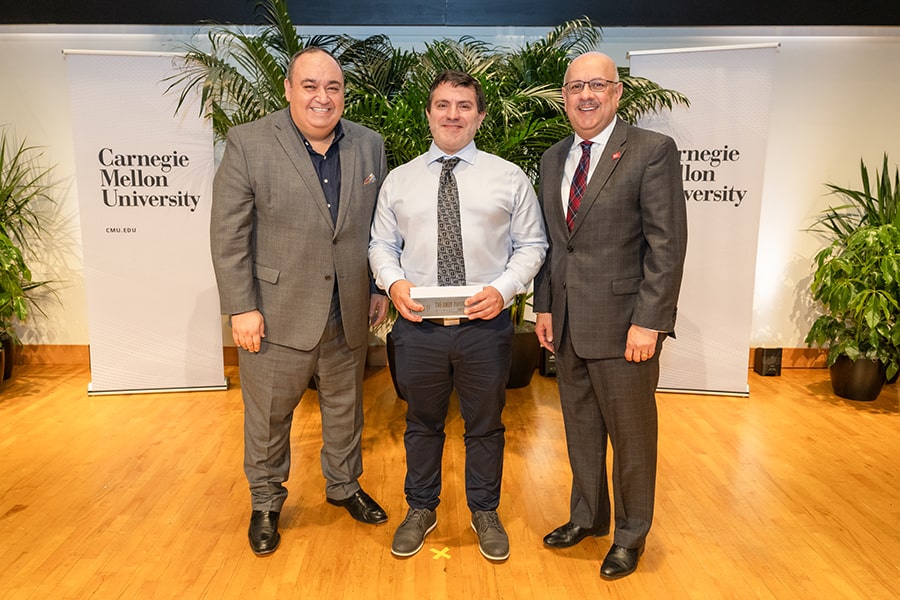
Justin Dawber with Vice President for University Advancement Scott Mory and President Jahanian.
Beyond directly supporting the needs of the department, Dawber extends his expertise and support to the community. He offers an intern program for local IT students to participate in and learn about university IT, evolving a pool of candidates for openings within the university.
Dawber also develops cross-departmental partnerships to ensure seamless collaboration through technological continuity and backup for critical processes. He partners with University Computing to leverage their support for the department’s evolving needs, and even steps beyond those offerings to tailor support for the department.
Recognizing the inefficiencies and confusion caused by varied avenues for requesting technical support, Dawber implemented a hybrid support model for the department. He created a streamlined IT help interface to centralize requests in one place, from which he efficiently loops in relevant service specialists to address questions without delay or disruption.
Kristyn Williams, director of finance and operations for IS, said “Justin works tirelessly to create a work environment that encourages others to embrace change and creativity. He consistently steps beyond his role to not only share information but to also contribute to others’ projects in a meaningful way.”
Williams says Dawber’s expansive thinking and commitment to organizational effectiveness served the department well at a critical moment when the pandemic hit and the department moved to virtual work. His work a year earlier transitioning file storage to a cloud-based model ensured colleagues had ready access to work. And his quick implementation of support procedures ensured the staff was trained and knowledgeable on virtual platforms such as Zoom, Cisco, Jabber and shared team spaces. “He made the transition to 100% virtual operations at the height of the pandemic effective and efficient, maintaining our service model to support the faculty research and teaching program,” she said
Dawber has made the department and the university better and more effective through his hard work and creativity. As Williams puts it, “He creates value and enhances our strength and capabilities to serve our community with creative, forward-thinking process improvement.”
Spirit
Timothy Angert
Machine Shop Manager
Robotics Institute
On paper, Tim Angert’s title is machine shop manager, so you’d be forgiven for thinking he spends his days among the Robotic Institute’s drill presses and lathes. In reality, Angert is seemingly everywhere in the department, offering his expertise and enthusiasm to anyone who needs it — whether spending hours after work assisting high schoolers in Girls of Steel in finishing their robots, or walking with library archivists to catalog historical artifacts around Newell Simon Hall, or wearing a full-body clean suit to help the student Iris Lunar Rover team assemble their moon-bound robot.
“If Tim had a motto, it would be ‘I can do that,’” said Associate Professor Henry Admoni. “I haven't yet seen him turn down a request for help or walk away from a chance to contribute his mechanical and organizational know-how.”
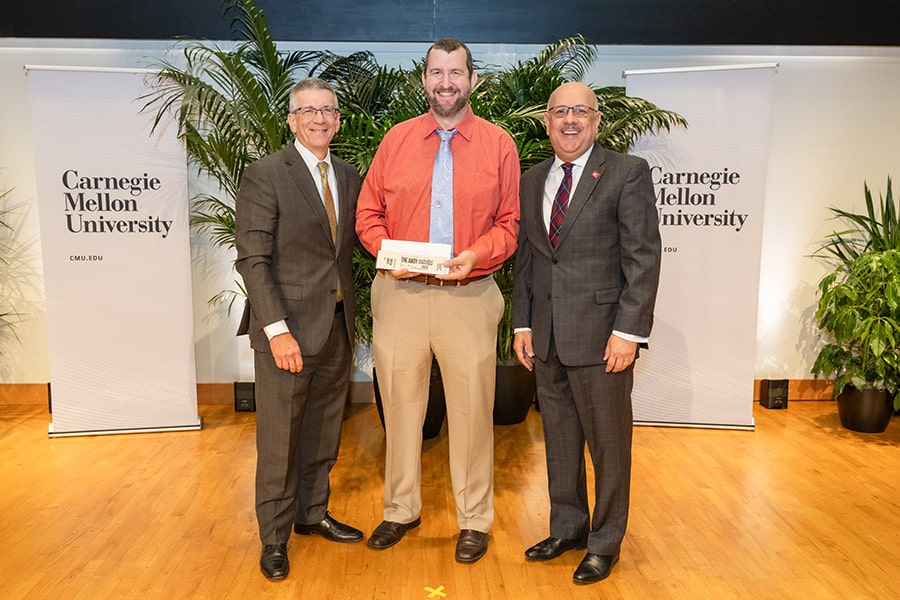
Timothy Angert with Provost Jim Garrett and President Jahanian.
Angert runs the robotics shop and supports a vast portfolio of research and student projects. He is extremely generous with his time, approachable and compassionate with others, and steadfast in his dedication to the department.
“Tim is a teacher at heart, as well as by training, and it shows in the way he approaches his life in the department,” said Admoni. “He is patient, kind, and willing to let people work through a problem themselves before jumping in to offer advice. At the same time, he knows when to step in to guide people in the right direction, making them feel like they earned the win.”
In addition to helping to solve day-to-day problems that arise, Angert is a veritable “filing cabinet” of Robotics Institute information. He is generous in sharing his vast knowledge of faculty, staff and projects past and present, which serves to pass on departmental traditions and to help others connect the dots of robotics history and present day.
Angert is deeply committed to making RI a better place, serving as co-chair of the RI Climate Committee. He has been instrumental in spearheading initiatives supporting an inclusive workplace culture, extending to aspects of student recruitment and retention, as well as brick and mortar improvements that make the physical building a welcoming and comfortable place for all.
“Tim is quick to see what is called for, to initiate, to lead, and to get things done,” said Fredkin Professor of Robotics Red Whittaker. “He engages without limit, gives wholly of himself, inspires so many, mentors with effect, includes broadly and lifts others up. Tim is that rare gem who is operational, indefatigable, generous and excellent at everything.”
Teamwork and Collaboration — Standing Team
Mechanical Engineering DEI Committee
Gabi Cryster, Annie Harder, Eva Mergner and Yanika Reid
In their core roles, Gabi Crytser, Annie Harder, Eva Mergner and Yanika Reid are responsible for research administration or academic advising in the Department of Mechanical Engineering (MechE). As the staff members of the MechE DEI committee, however, they work tirelessly as a team to advocate for diversity, equity and inclusion in a way that activates and engages the broader CMU community.
“To put it simply, their leadership has been transformative,” said Associate Professor Christopher McComb, chair of the MechE DEI Committee. “They are innovative, determined, collaborative and selfless in their work. Our community would be a very different place if it wasn’t for them, and it is a very special place because of them.”
The four occupy vital leadership roles on the DEI committee, reflecting their dedication to its mission of building an inclusive and supportive community. Over the last year, the team has led the committee in thinking critically about the long-term sustainability of all that it does.
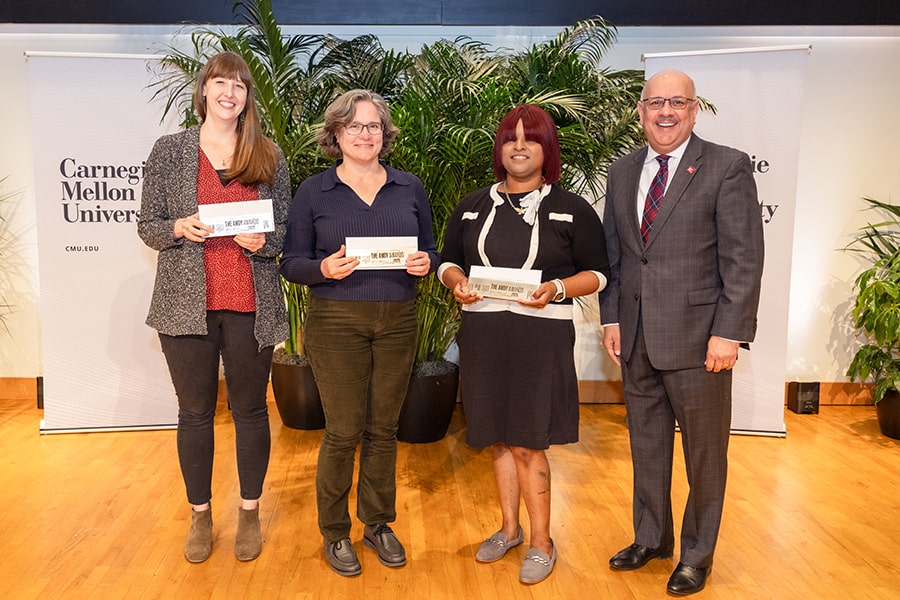
Annie Harder, Eva Mergner and Yanika Reid with President Jahanian. Not pictured is Gabi Cryster.
As co-chair of the Community Engagement Subcommittee, Harder helped to develop the Inclusive Teaching Fellows Program, where students help faculty create DEI modules for their classes. She worked across departmental committees, sought guidance from the Eberly Center, and built a support network for the student fellows.
As co-chair of the Logistics and Sustainability Subcommittee, Reid was involved in developing the mission and values for MechE DEI, as well as the organizational logistics for the committee. She is also working to develop a program addressing the “imposter syndrome” seen frequently in doctoral students.
Crytser is the other co-chair of Logistics and Sustainability Subcommittee, leveraging her financial acumen to oversee the committee’s budget and finances. She also recently led the development of a video highlighting the committee’s efforts.
Mergner co-founded the DEI committee with the goal of creating a safe haven where the underrepresented and marginalized can find a voice and the empowered can listen and learn. Now, as co-chair of the Education and Professional Development Sub-Committee, her primary focus is on the Inclusive Teaching Fellows Program. She also organizes monthly community conversations, which provide a safe space for discussion of topical issues.
All four actively engage with students, providing mentorship and guidance as they navigate the complexities of organizing and executing meaningful DEI programs.
“Their collective expertise and passion have been instrumental in fostering an inclusive environment where all students feel heard, valued, and empowered to make a positive impact,” said doctoral students Rishi Basdeo and Erica Martelly. “Their dedication to helping students build DEI initiatives and events reflects their commitment to creating a more equitable and inclusive future for our department and the wider university community.”
Teamwork and Collaboration — Special Projects
Winter Storm Elliott Response Crew
Mark Wesolosky, Mike Puharic, Jeffrey Harris, Tim Flaherty, Evan Orowetz, Jason Heider, Valerie Testa, Chris Massimino, Jenna Hovis, Frank Varrati, Harry Steele, John Arlet, Ryan Gilmore, Jennifer Bett, Rebecca Gaidrich, Bob Giffen, Mike Fife, John Mayhoff, Nicole Shughart, Tim Seskey, Chris Banga, Mike Jones, Terry Dodson, Chris Ervin, Ron Cunningham, Ralph Hilbert, Don Murphy, Chris Vojtko, Bob Shamonsky, TJ Emanuele, Mike Jones, Marc Baratka, Doug Garrard, Bob Artman, Phil Barner, Bill Weidensall, Rob Young, Rich Jenks, Bob Penn, Jason Sturges, Jim Murphy, Bob Ossman, Trevor Mahan, Ryan Meals, Francisco Molina, Diane Patterson, Jenn Rogers, Thom Thornton, Lenny Libbon, Dawn Roerink, Will Cline, Michael Dadey, Brent Grafton, David Stubbs, Jim Stapf, Steve Marutiak, Joe Spochacz, Bill Slafka, Dan Schwartzmier, Rory Cylenica, Dave Saunders, Steve Wengryn, Karl Johnson, Joe Piacquadio, Craig Hahn, Frank Michalski, Hammad Mahdi, Justin Hefflin, Jason Jamerson, Tarell Gray, William Waterman, Shaun McCartney, Brandon Swiech, Chester Harper, Dominic Nofi, Dennis Roberts, Gary Gregg, Shane Schmidt, Adam Blough, Michael Haney, William Crawford, Dennis Procacina, Steve Weale, Dave Geary, Greg Stanonik, Kevin Smith
With quick thinking amid extreme weather conditions, the Winter Storm Elliott response crew jumped into action to repair and mitigate damage from the extreme magnitude of the “bomb cyclone” that hit Pittsburgh last winter.
At the peak of the holidays, when most community members headed home to celebrate and stay warm with their families, the response crew worked tirelessly from December 23 through the new year to provide emergency response and damage control across 12 buildings on campus.
More than 100 staff members responded to the call, some working 16-hour shifts for several days in a row to staff the campus at four times normal levels. They also provided 24/7 support to stave off the freezing storm’s impacts, which included broken and frozen pipes, damaged fire suppression systems, flooded student housing and technological damage.
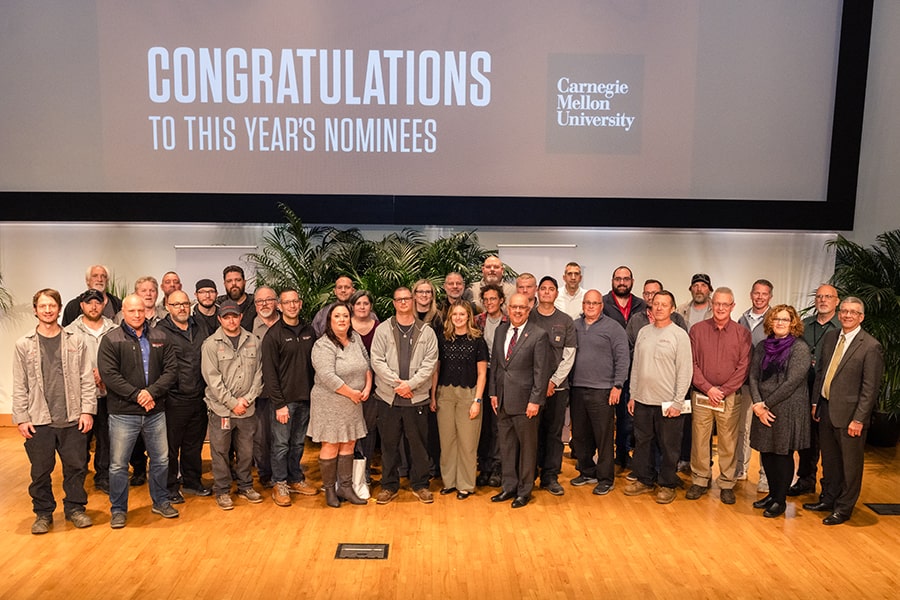
Members of the Winter Storm Elliott Response Team with Jim Garrett and President Jahanian.
“These individuals prioritized CMU, and the needs of our students, faculty and staff, above all else and truly had the university’s mission at heart,” said Charity Anderson, director of facilities operations.
The team assessed and prioritized damage response across campus, responding to immediate safety concerns and communicating consistently to understand damage, begin extensive restoration efforts and process insurance claims. Emergency crews repaired student housing damage in just four hours, ensuring students who stayed on campus over winter break remained safe and did not need to relocate. They repaired the Cyert Center, enabling it to open on time on January 3, as well as major campus buildings such as Posner, Doherty and Baker-Porter halls before the spring semester began.
The storm’s impact resulted in the single largest insurance claim ever submitted by the university. Thanks to the dedication and hard work of the response crew, more than $2 million in damage was restored in time for the university to resume work as planned after winter break.
Catherine Getchell, director of disability resources, noted that the only noticeable difference in the office after winter break was the new carpet, thanks to the emergency response crew’s expertise and rapid repair of affected areas.
The team’s professionalism and commitment to damage mitigation also resulted in saving a $10,000 piece of assistive technology that allowed a blind student to complete coursework. Getchell is grateful for the team’s understanding of the device’s importance and their efforts to save it, which included moving the 70-lb. embosser multiple times as damage in the office progressed. “My team and I are profoundly grateful to every single staff member who helped in this recovery effort, at a time when we were all supposed to be taking a break and being with our families,” she said
Chemistry Professor and Director of Undergraduate Studies Karen Stump noted, “The fact that I was able to see students in my office on the first day of classes felt almost miraculous and is a testament to the effectiveness and work ethic of this team.”
